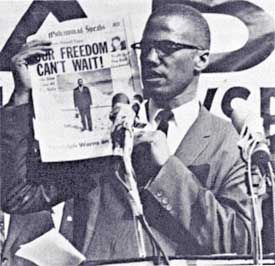42 years after assassination
Malcolm X inspires militant struggle against racism
By
Monica Moorehead
Published Feb 18, 2007 5:55 PM
On Feb. 21, 1965, revolutionary Black nationalist leader Malcolm X was
assassinated while making a speech at the Audubon Ballroom in Harlem, N.Y. He
was only 39 years old. To this day, it is still widely believed throughout
progressive sectors that the U.S. government was very much behind his
death.
Consider the fact that the Federal Bureau of Investigation, a repressive arm of
the U.S. Justice Department, began keeping a file on Malcolm X—then
Malcolm Little—in March 1953, upon his release from prison. It was during
his prison term that he became politically radicalized and joined the Nation of
Islam, a Black Muslim organization.
The file on Malcolm X, more than 3,600 pages and 19 sections, was part of the
FBI’s Counter Intelligence Program—COINTELPRO—which targeted
political formations and individuals advocating various forms of liberation
struggles of oppressed nationalities.
Malcolm X evolved into one of the most dynamic representatives of the NOI and
the Black struggle. He traveled throughout the United States, speaking to
predominantly Black audiences and to many white college students about the
political and economic oppression of Black people inside the United States and
worldwide.
Malcolm used historical facts and disarming political formulations to explain
in a popular manner why Black nationalism was a more than justified response to
an institutionalized racist ideology, as opposed to being
“anti-white”—a distorted view projected by the big-business
media.
He popularized the concept of Black people’s right to armed self-defense
against the state-sponsored racist terror of the police and the U.S.
government. This concept helped to give birth to the Black Panther Party in
Oakland, Calif., in 1966, and to other revolutionary formations like the Young
Lords, a Latin@ youth organization.
He along with Martin Luther King spoke about the right of Black people to
reparations for the generations of racism and national oppression brought about
by the legacy of slavery. He created the immortal phrase “By any means
necessary” in relation to the various tactics Black people should use to
win liberation.
In the aftermath of his travels to Africa, the Middle East and elsewhere,
Malcolm X was in the process of developing an anti-imperialist perspective when
he was tragically struck down.
He had just formed the Organization of African-American Unity as a vehicle for
uniting other political currents within the Black liberation movement. He was
planning to bring worldwide attention to the plight of African Americans to the
United Nations.
Forty-two years after his death, Malcolm X remains a revered figure of defiance
against all forms of racist oppression, especially among the youth as well as
progressive and oppressed sectors of workers.
Excerpted from a Feb. 26, 2004, article.
Articles copyright 1995-2012 Workers World.
Verbatim copying and distribution of this entire article is permitted in any medium without royalty provided this notice is preserved.
Workers World, 55 W. 17 St., NY, NY 10011
Email:
ww@workers.org
Subscribe
wwnews-subscribe@workersworld.net
Support independent news
DONATE


